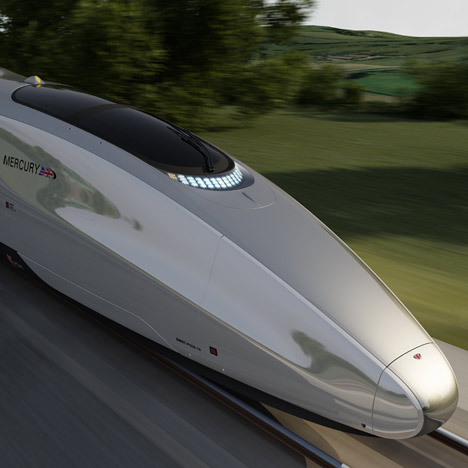
British designers Priestmangoode have unveiled a conceptual high-speed train for the UK.
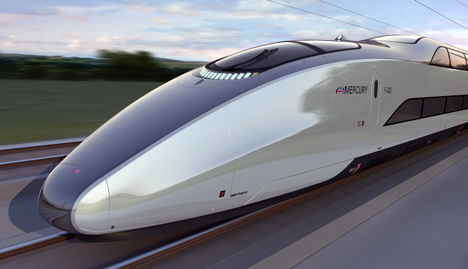
The London studio have created the design, entitled Mercury, in an attempt persuade the British government to advance the project.
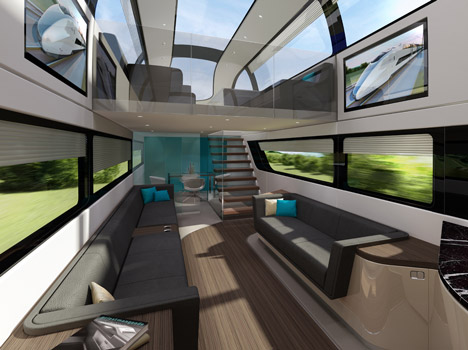
Their 400 metre-long, double-decker train would travel at 225 mph and have one of the longest nose sections in the world.
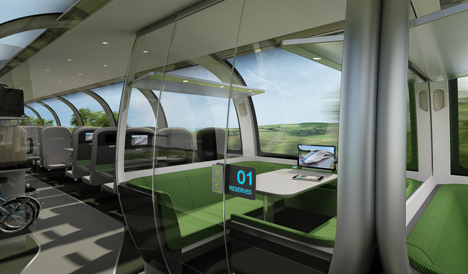
The interior would have areas with commuter seats and private berths, a childrens play area, and lounge and bar.
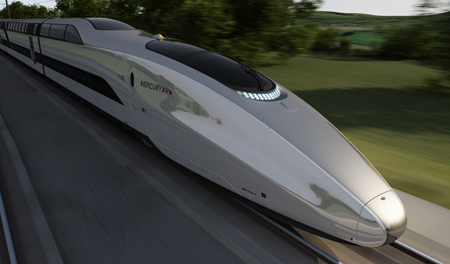
Here’s some more information from the designers:
Britain’s leading transport designer unveils plans for new high speed train
Britain’s leading transport designer has unveiled his concept for the UK’s new high speed train in a pre-emptive move to persuade the government of the urgent need to move forward as soon as possible with the project.
Paul Priestman of Priestmangoode, designer of the iconic Virgin Pendolino train, believes that the new high speed train is vital for the future of Britain, both as the low-carbon, sustainable transport of the future and as a crucial opportunity to champion British design and engineering in an increasingly competitive global economy.
Priestman believes his concept, Mercury, could be the new Great British design icon, following in the footsteps of Concorde, the Spitfire, Rolls Royce and the Routemaster bus and reawakening Britain’s authority as a global leader in design and technology.
Currently working with Sifang to design high speed trains for China and the rest of the world, Priestman believes that whilst the economic and political benefits of a world-class high speed rail network are clearly understood, having a train to be proud of is equally important. He believes that an iconic design is imperative in order to show Britain’s credentials to the world and in the battle to make Britain’s transport infrastructure more sustainable – by persuading people to leave their cars at home, eschew domestic air travel and make rail their first choice.
“It’s shameful that in the 21st century when we have to compete more than ever with the rest of the world, we don’t have a modern day global transport design icon to fly the flag for British industry.” says Priestman.
“Britain has an unrivalled record of great transport engineering projects – a record that died with Concorde. If we are to operate in a global design marketplace, we need to re-establish that influence by producing world-beating designs, moving the British engineering industry forward again and giving the country a much needed boost.
“But we also need to persuade people to travel by train to achieve a successful low-carbon economy. To do that, train travel needs to be as exciting as air travel and as sexy as the latest car. Not only does it need to be fast, it needs to be modern, luxurious, exciting and stylish. Mercury is all those things”.
About Mercury:
Mercury will be the first double-decker train to operate in the UK, with a unique interior design that Priestman believes will revolutionise domestic rail travel.
Introducing an entirely new concept in the way we travel, the train will incorporate a flexible, open plan design allowing for interaction, space and relaxation without compromising privacy. Both commuting and longer haul journeys will be more relaxed, comfortable and akin to modern living, featuring traditional commuter seats (designed to incorporate in-transit entertainment systems) alongside private berths – for families, private parties or business meetings echoing the nostalgia of compartmental train travel. A children’s play area will be integrated into the train and a luxury first class section will mirror the choice offered to air travellers with a luxury lounge and bar.
The exterior of the train, designed to emulate design classics such as Concorde, the Spitfire and Rolls Royce, will be 400 metres long and the extended nose section will be one of the most extreme in the world – vitally important for the aerodynamics of a train which will travel at 225mph.
No comments:
Post a Comment